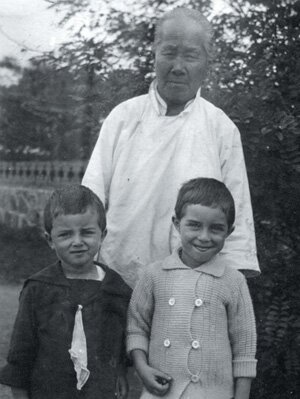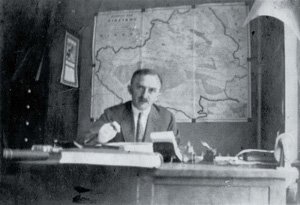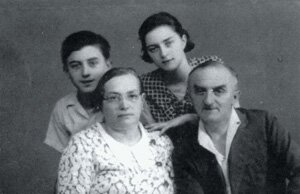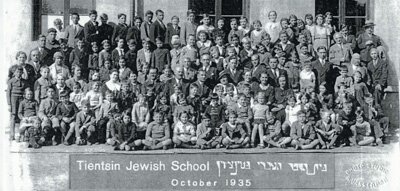| Growing up in Tientsin - from the memoirs of Benjamin Kabuliansky |

|

|
|
This story evolves from my personal experience and depicts (I believe) a pattern of behavior, or mode of thinking, characteristic of a considerable number of Jews who lived in Tientsin in the 1920s and 1930s, irrespective of their post-China destinies. Of course, my youthful thinking has been broadened throughout the years that followed. The Jewish community of Tientsin consisted of approximately 3.5 thousand people in the 1930s. It was headed by Leo Gershevich. There were a number of Jewish communal institutions established. The Tientsin Jewish School (TJS) was opened in 1925, the Jewish Club “Kunst†in 1928. One of the most remarkable characteristics of the Jewish community in Tientsin is that, in a relatively short period of time, it managed to create conditions, allowing Jewish children to obtain initial school education, and provide conditions for cultural and religious activity of grown-ups.
My father, up to the year 1935, worked in a fur trading company as an accountant. Our family lived on Dublin Road in the 1930s not far from the Tietsin Grammer School, which I attended along with my sister. I liked to watch the long pontoon boats being propelled along the narrow canal using poles; the Chinese boatmen were skilled in their craft. Across the Haihe River there was a drawbridge allowing the passage of vessels underneath. I am sure that there are still some Tientsiners who remember the fateful day when a mishap brought the bridge into motion in the morning, when it was full of pedestrians and vehicles. There were some serious casualties. It was a place that would make for colourful childhood memories. I liked to go to the bund on the river and watch the stevedores unload ships, which came inland from port Taku. This was at times a disturbing observation even for a boy, as I would watch a toiler, clearly underfed and weak, carrying heavy loads out of the ship’s hold. He would get a counting stick for each journey from a foreman, and after receiving his meager pay (several tungdzer) would buy ‘manto’ and a bowl of tea or just hot water. Recently I came to know that the Haihe River has become much narrower and big ships don’t reach Tianjin. While the river was a central place for commerce and activity amongst all residents of Tianjin, for the Jewish community, the Jewish communal organisations were clearly central as well. The synagogue I recall was probably a temporary one, which I went to with my father. It was not the one so often pictured in journals and books. Because our family was not really religious, I probably only visited the Synagogue several times a year on Jewish holidays. As to the TJS and the Kunst Club, I can still recollect some events. First of all, I have to say that I never studied in the TJS, but remember that my mother G.J.Kabuliansky (nee Gershevich) was very active in the formation and development of the Jewish school in Tientsin. I remember that while my sister Annie and I studied in the Tientsin Grammar School, our mother devoted a lot of time to the improvement of teaching standards at the TJS. At home I could often hear about the splendid work the school staff was accomplishing. In the photo below, taken in October 1935, we can see the pupils of the TJS with their teachers and members of the School board (among them are my uncle L.Gershevich and my mother, the lady wearing eye-glasses in the 4th row.) In spring, Jewish children were usually taken to the outskirts of Tientsin where they celebrated the Lag B’omer holiday in the woods. Here we played all sorts of games and took part in different competitions. Children also took part in the school fees all those years, prioritizing and economizing on less important expenses. The only other preference, demanding additional savings was the much anticipated annual summer vacation in Peitaiho. Peitaiho, located in China’s Hebei Province, was a popular retreat for Tientsin’s residents at the time. We loved going to the seaside as a family! My oral Chinese began with my amah. I even knew several rhymes, one of which began with the words: “a little mouse went to the market…†At this stage, my family and I automatically accepted the Chinese name given to me by my amah. It was Siau Bina (Small Ben). When I was about ten, my parents wanted me to learn writing and invited a qualifi ed Chinese teacher, but I failed utterly: the most difficult character, which I “saddled†was that designating “ma†(horse).Â
 My next teachers were rickshaw pullers, waiting for clients on the corner, not far from our first rented apartment on Elgin Avenue N383 (English Concession). I would come up to them and say “Ning hauâ€. They had a habit of squatting and their heads and mine were on the same level - this allowed us to have a very nice chat. I clearly remember that some of them would pat my knees (I wore shorts). This was only one of the first signs of affection of Chinese people in respect to children, which I observed again and again. Here I should note that the language in my presence was totally respectable. As to some words involuntarily pronounced by rickshaws “in action†on the streets, describing “family relationdifferent concerts organised in the Jewish club. I, personally, enjoyed going to the club library during the period from 1932-1936. It was from here that I had access to dozens of books in English, mostly the classics written by Charles Dickens, Jack London, Jules Verne and others. Jewish children in Tientsin studied in several different schools: the majority of kids attending the Tientsin Jewish School (TJS) belonged to those families who could not afford to pay the fees charged in the other schools. And what was most important for the Jewish children was that there was practically no anti-Semitism. This was in harmony with the environment away from school: this seems to be in agreement with the common notion that China was traditionally tolerant to the Jews. Most of the families belonging to the middle class and the rich ones sent their children to the American School, the Tientsin Grammar School (TGS), and the St. Louis and St. Joseph colleges. My sister, Annie, and I studied in the TGS which was located in the English Concession. All basic subjects were taught in English by native speakers. The high standards of teaching allowed children to take the Cambridge University Junior Local Examination, and a year after that, the Cambridge School Certificate Examination. Children of many different nationalities studied together here for 10 years. Providing the best possible education was a priority in the majority of Jewish families. Our family was not an exception. My parents managed to pay the school fees all those years, prioritizing and economizing on less important expenses. The only other preference, demanding additional savings was the much anticipated annual summer vacation in Peitaiho. Peitaiho, located in China’s Hebei Province, was a popular retreat for Tientsin’s residents at the time. We loved going to the seaside as a family! My oral Chinese began with my amah. I even knew several rhymes, one of which began with the words: “a little mouse went to the market…†At this stage, my family and I automatically accepted the Chinese name given to me by my amah. It was Siau Bina (Small Ben). When I was about ten, my parents wanted me to learn writing and invited a qualified Chinese teacher, but I failed utterly: the most difficult character, which I “saddled†was that designating “ma†(horse). My next teachers were rickshaw pullers, waiting for clients on the corner, not far from our first rented apartment on Elgin Avenue N383 (English Concession). I would come up to them and say “Ning hauâ€. They had a habit of squatting and their heads and mine were on the same level - this allowed us to have a very nice chat. I clearly remember that some of them would pat my knees (I wore shorts). This was only one of the first signs of affection of Chinese people in respect to children, which I observed again and again. Here I should note that the language in my presence was totally respectable. As to some words involuntarily pronounced by rickshaws “in action†on the streets, describing “family relationshipsâ€, these, I am sorry to say, were firmly implanted into my vocabulary. Our parents thought that we, children, should not take a ride with a rickshaw, considering that it would be humiliating for the latter. However, when they themselves did hire a rickshaw, it was thought to be acceptable, since these toiling people “had to make a livingâ€. My parents allowed me to communicate with people on the streets, and I did so, practically without any restraint. When I got older, I often came to a neighbouring workshop to repair my bicycle. This was a great occasion for an exchange of views in Chinese. The interesting thing about my ‘machine’ was that it really was a lady’s bike. My sister swapped it with me for a fountain pen, which I received as a birthday present. You can imagine the quality and reliability of my vehicle. In this way, during more than 10 years, I received an important part of my own education in the streets. I spoke to hundreds of Chinese people, young and old. Here are just some cases, which I happen to remember most of all: I spoke Chinese in Tientsin shops and with grocers in Peitaiho who carried their fruit and vegetables in huge baskets. Living there in summer, I would get up early in the morning, run to the seashore and watch fishermen coming in on their boats with a catch of flat fish and huge crabs. I was always with a fi shing rod and thought that this gave me the privilege to drop a word or two, and expect a short answer from those people, busy selling their take, right on the spot, and loading their baskets with fi sh to becarried around and sold all over Peitaiho. Any money saved by me was used for a donkey-ride; striking a deal with the donkey driver demanded fluency in the language, and more often than not, we were allowed to take the donkeys, promising to bring them back to the donkey-drivers at a certain time. In Tientsin, in one of the recreation grounds, together with the local Chinese children, I flew a kite, and gazed with envy at a beautiful sample of a hawk “piloted†by some lucky boy. Of course at my age, the only educated person whom I had a chance to speak to in Chinese was an oculist in a Peking hospital. I was so grateful to him for helping me to get rid of the squint I had. Whenever I came to the office where my dad was working (he was an accountant-bookkeeper in a fur-trading company) I stole the opportunity to speak with the Chinese employees. Several times I attended dinners, rather - feasts, on the Chinese New Year. Here I really came to truly know the meaning of Chi Boula (I’m quite full). But, most of all, I was eager to see these people being invited to our home by my parents for the Jewish holiday, Hannukah, because I knew that I would be presented with “Hannukah Gelt†- coins worth 1 Yuan each (not so bad for pocket-money). There were many opportunities to mix with the Chinese in social and business interactions.
Our lives were rich with communal activities and a vibrant community. As children we played with not only members of our community but with local Chinese as well. The only Chinese name I remember is that of a youth by the name of Ma-Ting-Yu, who helped us around in preparation for our departure to the Soviet Union in 1936. He was about three years older than I. We were friends for several months and our favorite activity was wrestling around the apartment (sometimes Chinese style). We were surrounded by Jewish friends and relatives. Out of the ten children born in Siberia in the Jewish family of Gershevich (my mother’s family), five found themselves in Tientsin, China at the beginning of the 20th century. This included the elder brother, Leo, another brother Moses, their sisters Sarah, Tsiva and my mother. Leo had 3 children: Norman, Vera and Fishel (Fisha). Fisha moved to Israel from Tientsin in 1933 and served for many years in the Israel Defense Force. Vera later lived in Canada. Tsiva married Ilya Fligil who was, for more than 20 years, the Vice-President of the Tientsin Jewish Community and was also a member of the Kunst Club board. I remember several other Jewish families — good friends of my parents: the Bihovskies, the Epsteins, the Jacobsons.and the Bihovsky family. In pre-war China (1934- 1936) I witnessed several events involving the Japanese military. In about 1934 or 1935, the Japanese had already been pushing from occupied Manchuria into Northern China. That year my father was jobless. The fur company where he had worked went bankrupt. Our mother was already in Peitaiho, organising the vacation boarding for several families, including ours. Our father saw us off from Tientsin. I and my sister Annie who was two years older than I, were sitting in a hard-seated carriage. Not far from us were several Japanese soldiers with baskets full of pigeons. About two hours after we left Tientsin, something horrible happened: all of a sudden, there was a terrific blast and the train stopped. We soon found out that between our carriage and the steam engine, there were two carriages, and in one of them there was a huge explosion, which killed many people and injured a lot of others. Most of them were Chinese. A woman came into our carriage and asked for some dressing; my sister found a couple of bed sheets in our suitcase and gave them to the woman for bandaging the wounds. Through the window I saw the horrifying results of the carnage. Very shortly, the Japanese soldiers wrote several messages and sent them off with the carrier pigeons. Then they climbed up the telegraph poles and, probably sent a message by wire. The train reached Peitaiho several hours behind schedule. Our mother was among those meeting the passengers; everyone was, of course, deeply agitated about what had happened. As far as I remember, the main version explaining the explosion was that this train was the first to open a new service on the Tientsin-Mukden route.Many people were against it, considering it to be an intrusion into North China. The bomb, which went off in the carriage was apparently meant to provoke tension. In another incident, once while I was riding my bike in Tientsin, on the other side of the road there was a quarrel between a Japanese officer and a rickshaw about the price charged by the latter. The officer unsheathed his sword and struck the rickshaw with the flat side of the sword. What a humane act! In either 1934 or 1935, together with a group of boys, we drove donkeys and reached the dunes north of Peitaiho. We were approached by a detachment of Japanese military men on horseback. I don’t remember in what language they began asking questions, which we couldn’t answer. Then they drove to the north in the direction of Shanghaigwan, and we safely returned home. My childhood in Tientsin soon ended. We returned to the Soviet Union in 1936, the rough times of that period quickly brought my sister and me to maturity… but this is another story. Tientsin, though just a part of my past, remains very much alive for me. It is at the heart of my childhood memories and an important part of Jewish history.
(Issue October 2008)Â |





















